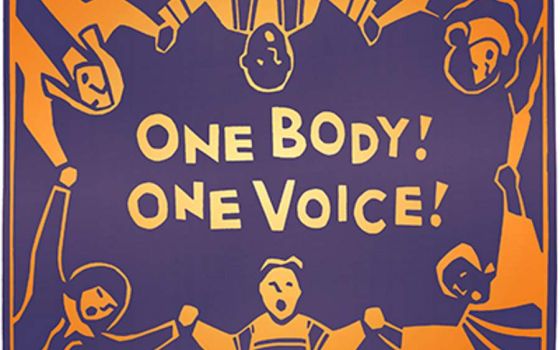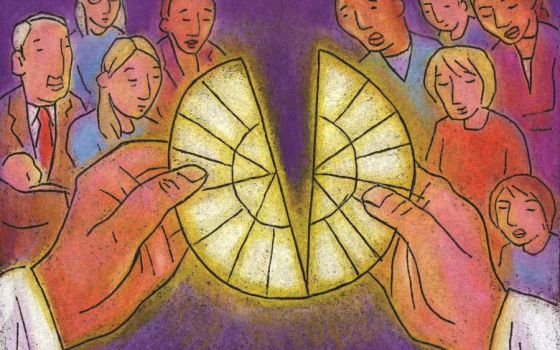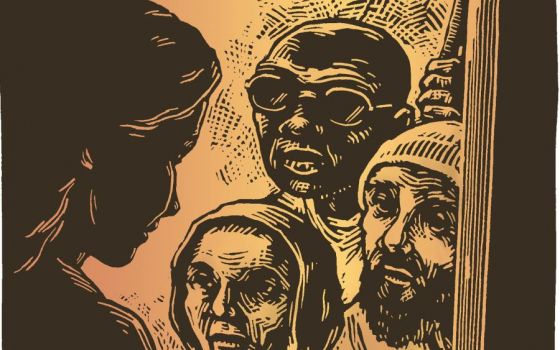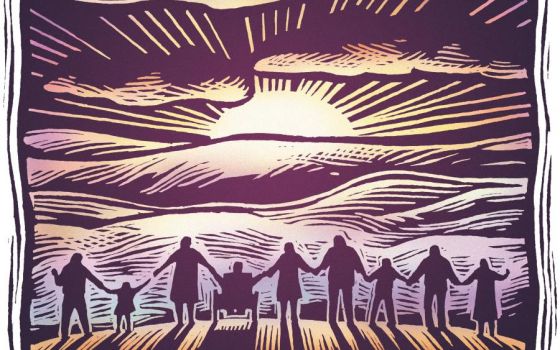
(Julie Lonneman)
Like the Christians who came before us, we live in uncertain times. For us, Pentecost is much more than a symbolic celebration. It arrives each springtime as a new creation, heralding an extraordinary season laden with gifts, challenges and God-given surprises.
Unexpected presentations
In the beginning when God created the heavens and the earth, the earth was a formless void and darkness covered the face of the deep, while a wind from God swept over the face of the waters. (Genesis 1:1-2*)
Where do you turn for inspiration, for challenge or for consolation?
Some years ago, I returned to my Scottish homeland to face a turning point in my life. Hoping to find my bearings, I made a pilgrimage to the remote isle of Iona in the Scottish Hebrides. Amid the rugged majesty of the ancient abbey, I was delighted to discover the raucously unpredictable Spirit-force, depicted not as the dove from the ark or the Jordan baptism, but as a wild goose of the wind-swept Atlantic; an image that harkened back to the wayfaring Celts who first made those islands their home.
I was enchanted by the landscape, and completely captivated by the charisma of the ecumenical Iona community. Together, they illustrated three dimensions or presentations of an untamable life-force we call Holy Spirit. The ceaseless wind, foaming surf, mossy rocks and screeching seabirds combined with the peace, justice, healing charism of the Iona community, to conjure that primordial, wild and free spiritual energy that is ever inspiring, always disturbing and endlessly consoling.
Spiritual outbreak
I baptize you with water; but one who is more powerful than I is coming; I am not worthy to untie the thong of his sandals. He will baptize you with the Holy Spirit and fire. (Luke 3:16)
How can we access the abundant energy-field of Spirit, and make ourselves available to its powerful gifts, its momentum, its explosive trajectory?
As a young theology student, I had become comfortable with Holy Spirit as a reasonable concept; a trinitarian character, well-contained within in a well-designed, ethereal interplay. Only later, through cross-cultural and interreligious encounters and challenging life experiences, did that Spirit break through those mental confines and break out into my life; to shake me and wake me up. Surprisingly, these Spirit-encounters were not the supernatural stuff of movies or pious melodramas. They were profoundly natural and palpable expressions of surprise, wonder, awe, compassion, humanity, gratitude, grief, remorse, forgiveness, suffering-love and always, always humility.
Bonding force
For where two or three are gathered in my name, I am there among them. (Matthew 18:20)
Have you ever entered a roomful of people, participated in a ritual, or been drawn into a heartfelt conversation, and felt an immediate sense of intimacy, acceptance and a warm, inclusive welcome?
There is one important spiritual precondition, a caveat we cannot afford to overlook in our increasingly individualistic, atomized culture. According to Gospel tradition, Holy Spirit is not a personal superpower which individual faith-in-action heroes can harness for their unique exploits. Indeed, it was while visiting the Iona community that I first heard Holy Spirit described as "the sparks that crackle between us."
We describe as holy or sacred those experiences of wholeness or all-togetherness that draw us near. It is when we gather with others, as community, hungry for connection and unanimity (to be of one spirit) that the power and agency of this Spirit energy-field is amplified through our personal and shared lives. And, it is always for the healing-restoration of our world. Like the molecular bonds that hold everything in the universe together, Holy Spirit is a binding, unifying force that brings all things near and brings us nearer to all things. All it takes is a few, two or three or more, who deeply desire to be brought into togetherness, who long to belong and wish to be made whole.
Breath of fresh air
Then the [Holy One] formed [a human] from the dust of the ground, and breathed into [its] nostrils the breath of life; and the [human] became a living being. (Genesis 2:7; text in brackets added to provide inclusivity.)
When was the last time life took your breath away?
Anyone who has known breathlessness appreciates the powerful gift of a lungful of fresh air. That invigorating rush of oxygen clears the head, flushes the cheeks, as it sharpens our vision and heightens our awareness.
So much of the majesty of each passing moment so easily passes us by. Astonishment, which literally means being thunderstruck, is one of the clearest indicators of the vitality of our spirit-life. Being astounded means being jolted awake, beside ourselves with amazement. This invariably leads us to wonder, which opens our hearts to a sense of awe or reverence for the splendid mystery of life. And reverence always culminates in expressions of gratefulness.
Conversely, when we encounter breathtaking vistas or gasp aloud at wanton desecrations and tragedies, inspiration can also steal the very breath from us. At any given moment, and all moments are gifted, we are offered opportunities to explore the magnificent mystery of being alive, wide-eyed and open-hearted. In the clarity of astonishment, a veil lifts and we understand that there is nothing ordinary about existence. We might even say: If we are not astonished, perhaps we are not yet awake.
Disturbing to the core
When it was evening on that day, the first day of the week, and the doors of the house where the disciples had met were locked for fear of the [Temple authorities], Jesus came and stood among them and said, 'Peace be with you.' After he said this, he showed them his hands and his side. Then the disciples rejoiced when they saw the Lord. Jesus said to them again, ‘Peace be with you. As the Father has sent me, so I send you.' When he had said this, he breathed on them and said to them, 'Receive the Holy Spirit.' (John 20:19-22)
When was the last time your heart broke open, and you were physically moved with compassion?
This question offers yet another metric to measure spiritual well-being. When we understand Holy Spirit as a moving, motivating force, it is worth practicing those Ignatian exercises that explore the driving forces behind our daily decisions, intentions and interactions. Faithful people like us have long-struggled to break free from the twin tyrannies of the expectation of reward and fear of punishment.
These days, there is a good deal of fear in our lives; fears exploited by media and fear that colors public discourse. And there is much to feed our fears: global climate change and environmental devastation; social breakdown; growing economic disparity; pervasive violence and oppression; weapons of unimaginable destruction; conflict and competition over ever-depleting natural resources; and much more.
Fear remains a powerful motivating force in our lives, and our religious institutions are not immune to its divisive influence. When we are frightened, we draw the curtains, we huddle together with safe, like-minded folk, behind barred doors, with hearts and minds closed tight. This need to feel safe and secure in uncertain times can lead us to spiral inward. When fearful, we hide ourselves and our resources, we hold back, we become suspicious of the differences, needs and motives of others.
Moved by a primitive instinct to protect ourselves, we erect a bulwark of absolutes to keep us safe. Driven by fear, we walk into dungeons of our own design. Here the expanse of mystery, the humbling wisdom of not-knowing, the gifts of gratitude, the awe-filled perspective of abundance, the foundation of trust, and the healing power of deep listening all seem beyond our reach. Here we are left to wrestle with the bitter fruits of fear: segregation, stockpiles, starvation and spiritual asphyxiation.
It is no surprise that fear-driven communities tend to be: autocratic; focused on command and control; domineering, dogmatic and self-preoccupied; deprived of creative diversity; rigid and hard-hearted; unwilling to embrace moral complexity; drawn to judgment and punishment; suspicious of free spirits and new ideas; untouched by mercy, and inaccessible to compassion. And we might also add: If our hearts are not breaking at the sorrows and suffering in this world, perhaps we are slumbering through our lives.
Balm of consolation
Comfort, O comfort my people, says your God. (Isaiah 40:1)
How often have you mouthed a quiet plea out of deep concern for yourself or a dear one, or as reflexive response to tragic or tremendous events, playing out before your eyes?
It is the very experience and expression of compassion, being inwardly moved that melts fear and turns pain inside out. Only the disturbingly compassionate Holy Spirit has the power to unsettle us enough to shake us free from the avaricious temptations of the so-called "prosperity gospel," or its counterpoint expressed in the judgmental and exclusive purity cults that blight our faith communities.
In dire moments, when we are at our most vulnerable, the Gospels proclaim that the Holy Spirit can surprise us with a multiplicity of gifts to inspire, console and disturb us: a breath of life; a flash of insight; a glimmer of hope; unimagined possibilities; unforeseen strength, wonder, wisdom, gratefulness; understanding, awe and humble reverence. Such is the disturbing peace we can expect to receive and share, when we are willing to come together and cry out amid the turmoil of our times: Come Holy Spirit!
Advertisement
Deeper and wider
The Spirit of the Lord is upon me, because [God] has anointed me to bring good news to the poor. ... has sent me to proclaim release to the captives and recovery of sight to the blind, to let the oppressed go free, to proclaim the year of the Lord's favor. (Luke 4:18-19)
What gifts do we have, and what gifts do we urgently need in times like these?
In our own lives, the difference between a gift and a burden is often determined by how we receive it. So much that appears at first as burden can, in the end, become a grace-filled gift.
When we find ourselves backed into a fearful space and deeply troubled by turbulent times, it helps to keep in mind that our church was born in just such an unlikely place. In our fundamental expression of church, re-membered in the breaking of the bread, we acknowledge that there is another, deeper, primal and cosmic movement always at work in our lives and our communities.
In 1968, at the World Council of Churches, Orthodox Metropolitan Ignatius of Latakia offered this description of what happens when we neglect or try to suppress the free-flow and potent presence of the Holy Spirit:
Without the Holy Spirit, God is far away,
Christ stays in the past,
the Gospel is a dead letter,
the Church is simply an organization,
authority is a matter of domination,
mission is a matter of propaganda,
the liturgy is no more than an evocation,
Christian living a slave morality.
But in the Holy Spirit:
the cosmos is resurrected and groans with the birth pangs of the Kingdom,
the risen Christ is there,
the Gospel is the power of life,
the Church shows forth the life of the Trinity,
authority is a liberating service,
mission is a Pentecost,
the liturgy is both memorial and anticipation
and, human action is deified.
(Experiencing God, Kenneth Leech)
Pentecost begs a community and gifts it with a mission! It is in our encounters with the gate-crashing, free and fiery Holy Spirit of Pentecost that we are pulled into the outpouring spiral of God's healing mission we call salvation. The ultimate aim and trajectory of authentic spirituality is always down toward intimacy, and out toward ever broader connection. It is this ongoing reclamation of our original at-one-ness we recreate each Sunday in holy Communion.
This feral Spirit shows no respect for religious, cultural, ethnic, national, social, gender or ideological boundaries. It is a fence-jumper, border-crosser, door-buster and bridge-builder. And such spiritual momentum can also carry us up and over, or draw us down and under, every barricade of ideology, theology, caste, class or national agenda that would seek to separate God's children and the primordial oneness of creation.
Let the Spirit lead
Now there are varieties of gifts, but the same Spirit; and there are varieties of services, but the same Lord; and there are varieties of activities, but it is the same God who activates all of them in everyone. (1 Corinthians 12:4-6)
So, how do we get loosened up, and let the Spirit of Pentecost change our seeing, our being and our doing together?
It helps to remember that Holy Spirit literally adds new dimensions to our lives. And the humbler we are, the more willing we will be to let ourselves be drawn into that outgoing dynamic. Given the magnitude of the suffering and the scope of the crises we are facing, we can no longer afford to cower behind the ramparts of national or religious institutions. We need only cry out for and rely upon the Spirit that knows no denomination, and who promises to gift us with the breadth of wisdom and depth of understanding that we so sorely need. In so doing, we will be led into encounters with other seekers and join a vast movement motivated by a mission bigger than any one church or religious community can contain. As Paul counseled the first followers in Thessalonica: Above all, do not stifle the Spirit! (1 Thessalonians 5:19).
When we decide to cooperate with such a Spirit of Wholeness, it becomes more vital to be transformed, than to be right, more crucial to be loving than to be winning. Healing salvation can no longer be limited to me, my family, my nation, my religious or political affiliation. Together, we move from transactional (what do I get) to relational (how can I give) motivations, as we are drawn out by an ever deeper, wider love.
From the grassroots up and from the heavens down, Spirit gifts are freely outpoured and accessible to the whole community of believers, and to all and anyone hoping for wholeness and healing. These gifts are never self-serving. Just as Holy Spirit is experienced and expressed in the context of community, her gifts are given to salve the wounds of the world and heal the people most sorely afflicted.
One crucial question remains for us, in uncertain times like these: Are we ready and willing to go where such a Holy Spirit might take us?
When we catch our breath,
we acknowledge the Source of All Breath,
with every taking in and every giving back.
Resting in this Presence that connects us,
with the fiery passion of a love too big to hold in,
we breathe in … "Come Holy Spirit!"
we breathe out … "Holy Spirit Come!"
Spirit of the living Christ,
breathe into us new life and passion.
Bind us into one healing, forgiving body.
Draw us from isolation and lead us out
to face the whirlwind of pain and possibility together.
"All shall be well, and all shall be well, and all manner of thing shall be well." (Julian of Norwich)
Editor's note: This reflection was originally published in the May 2018 issue of Celebration. Sign up to receive daily Easter reflections.








